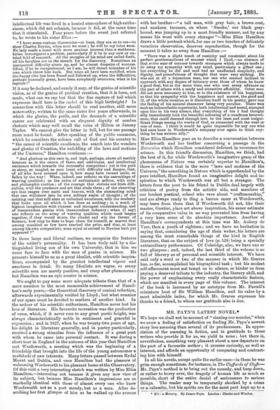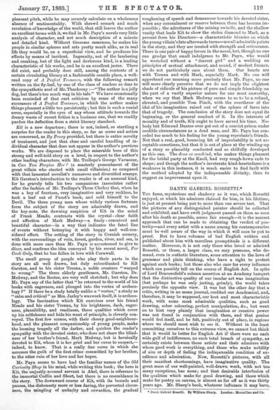MR. PAYN'S LATEST NOVEL.*
WE hope we shall not be accused of "sinning our mercies," when. we avow a feeling of satisfaction on finding Mr. Payn's newest story less amusing than several of its predecessors. In appre- ciation of the amusing in fiction, and in gratitude to those writers who provide it for us, we yield to none ; but there is, nevertheless, something very pleasant about a new departure on the part of a favourite author; it arouses cariosity, as well as interest, and affords an opportunity of comparing and contrast- ing him with himself.
In all his novels, except quite the earlier ones—in them he was grim enough sometimes, for instance, in The Clyffards of 011iffe- 21r. Payn's method is to bring out the comedy, and keep down, or rather to hurry over, the tragedy of human life as much as possible, short of the entire denial of seriousness to serious things. The reader may be temporarily shocked by a crime or a calamity, but his spirits are for the most part kept up to a.
• Kit : a Memory. By James Payn. London; Chatto and Windim.
pleasant pitch, while he may securely calculate on a wholesome absence of sentimentality. With shrewd remark and much revelation of knowledge of the world, that still leaves the author on excellent terms with it, we find in Mr. Payn's novels very little analysis of character, and not much description of a minute and detailed kind. Without tiresome sameness, he makes his people in similar spheres and sets pretty much alike, as in real life they would be, on a superficial view, and he produces his effects by means of incident. Ingenuity, not of the lumbering and creaking, but of the light and dexterous kind, is a leading characteristic of his works, and he is an excellent jester. There did exist, and probably does still, among the contents of a certain circulating library at a fashionable seaside place, a well- read copy of A Perfect Treasure, with the following remark written on the fly-leaf, by one of the class of readers so dear to the sympathetic soul of Mr. Thackeray :—" The author is a jolly dog, but there's too much wag in his tale." We have occasionally been reminded of that curt criticism by some of the many successors of A Perfect Treasure, in which the author makes things pleasant a little too persistently; but this is such a venial error, especially in the eyes of any whose attitude towards the dreary waste of recent fiction is a business one, that we readily pardon the deflection from a strict literary standard.
Kit is a new departure; there is not, indeed, so startling a surprise for the reader in this story, so far as scene and action are concerned, as By Proxy provided, but there is entire novelty of treatment, and just that close and careful handling of in- dividual character that does not appear in the author's previous works. We are disposed to place the miserable hero of this strong and well-told story on a level, in respect to the author's other leading characters, with Mr. Trollope's George Vavasour, in Can You Forgive Her ? (a masterly presentment of the great villain who started with small villainies,) as compared with that lamented novelist's numerous and diversified scamps. Kit Garston's introduction to the reader is of an unusual kind, for he gravely tells his two companions (associates rather after the fashion of Mr. Trollope's Three Clerks) that, when he was a boy of fourteen, very imaginative and very reckless, he took a leaf out of Faust's book, and sold himself to the Devil. The three young men whose widely various fortunes form the subject of the story are admirably drawn, and the key-note, the dawning suspicion of Kit in the mind of Frank Meade, contrasts with the crystal - clear faith and affection of Mark Medway—a finely - conceived and beautiful character—in a way that indicates the fated line of events without betraying it with happy and well-con- sidered effect. The setting of the story in Cornish scenery, with the surroundings of ruin, forest, garden, river, and sea, is done with more care than Mr. Payn is accustomed to give to decor, and confirms the idea conveyed by his recent novel, For Cash Only, that he has fallen in love with Cornwall.
The small group of people who play their parts in the story are all well drawn, but duly subordinated to Kit Garston, and to his sister Trenna, a noble creature "warped to wrong." The three elderly gentlemen, Mr. Garston, Dr. Medway, and the Rector, are very well sketched; but why does Mr. Papa say of the latter that "he returned to the world of his books with eagerness, and plunged into the vortex of archwo- logy P" If there be a study totally unlike a "vortex," a study as "calm and critical" as Mrs. Jarley's waxwork itself, it is archmo- logy. The fascination which Kit exercises over his friend Meade and his sister Trenna, by his brightness, dash, eager- ness, plausibility, and readiness, those qualities which cover up his selfishness and hide his want of principle, is cleverly con- veyed. The first few scenes, with their cheery good-neighbour- hood, and the pleasant companionship of young people, make the looming tragedy all the darker, and quicken the reader's sympathy with the devoted sister, who does not share the blind- ness of her brother's friend, Mark Medway, but is heroically devoted to Kit, whom it is her grief and her curse to suspect,— indeed, to know. That is a really fine scene in which she assumes the guilt of the first crime committed by her brother, to the utter ruin of her love and her hopes.
Mr. Payn seems to have had the familiar names of the Old Curiosity Shop in his mind, while writing this book ; the hero is Kit, the unjustly-accused servant is Abel, there is reference to the immortal Codlin and Short, but there is no resemblance in the story. The downward course of Kit, with its bounds and pauses, the dishonesty more or less daring, the perverted clever- ness, the mingling of audacity and cowardice, the gradual roughening of speech and demeanour towards his devoted sister, when any concealment or reserve between them has become im- possible ; the adroitness of the mining swindle, and the shallow- vanity that leads Kit to show the stolen diamond to Mark, as a, present from his Directors—a characteristic blunder on which the young villain's fate afterwards turns—are all admirable points in the story, and they are treated with strength and seriousness. There is one pair of happy lovers in the novel, but, though no one can grudge that small indulgence to Mr. Payn, who would be wretched without a "dearest girl" and a wedding on principles of mutual attachment, and sound, if modest finance, we do not particularly care about them. Our hearts are with Trenna and with Mark, especially Mark. No one will apprehend our meaning more precisely than Mr. Payn, no one will more clearly perceive that we do not imply the slightest shade of ridicule of his picture of pure and simple friendship on the part of a vastly superior nature for one most unworthy, when we say that Mark Medway seems to us to be a refined, elevated, and possible Tom Pinch, with the overthrow of the idol of his imagination raised out of the sphere of farce into that of tragedy. The conclusion of the story does not equal its beginning, or the general conduct of it. In the interests of morality and of truth, Kit ought to have served his time. No- body but Edmund Dantes ever got out of a convict prison under credible circumstances as a dead man, and Mr. Payn has con- ceded too much to his feeling for the young reprobate's friends. Not that a real, good, bouncing bit of improbability is not ac- ceptable sometimes, but that it is out of place at the winding-up of a story so plausibly conducted and so skilfully developed as this one. The dens as machind, who makes things pleasant for the bridal party at the Knoll, had very rough-hewn ends to shape; and though the author's inveterate kind-heartedness is a weakness in this instance, it is much easier to find fault with the method adopted by the indispensable divinity, than to suggest an improvement upon it.







































 Previous page
Previous page